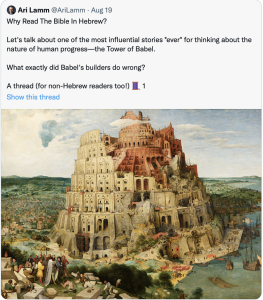Few stories in the Bible highlight the complexities of deconstruction and the way it divides us into speaking very different theological languages like the Tower of Babel in Genesis 11.
“What did Babel’s builders do wrong? Why did God punish them as he did? And what is the story’s message?”
These were the questions posed last month on Twitter by Ari Lamm, a religious historian who focuses on the relationship between religions across time. He also is chief executive of Bnai Zion, a 114-year-old organization that focuses on “Accelerating Israel’s growth and perpetuating social impact and peaceful coexistence through partnerships and meaningful projects with our friends and allies around the world.”
 Lamm utilized his understanding of the Hebrew language in a thread that reached nearly 2,200 words and brought together conservatives and progressives alike.
Lamm utilized his understanding of the Hebrew language in a thread that reached nearly 2,200 words and brought together conservatives and progressives alike.
Fascinating, yet almost fundamentalist
The responses to his thread mostly were positive.
Conservative commentator Glenn Beck said, “This thread about the #towerofbabel is so spot on and a lesson to us all.”
Conservative author David French added a paragraph in one of his articles about it: “It’s not often that I’m going to recommend a Twitter thread, but this series of tweets by Rabbi Dr. Ari Lamm is absolutely fascinating. It’s about how the nuances of the Hebrew language help us better understand the Tower of Babel.”
Graham McFarlane of the London School of Theology tweeted, “Perhaps the best and most interesting demonstration of why knowledge of biblical languages is not only so important but also why it makes for much more interesting reading of the texts. Long thread but oh so worth the time to read to the end.”
Even some non-religious people were saying the thread was wonderful.
But not everyone was fully on board.
Joel Baden, a professor of Hebrew Bible at Yale, responded: “This thread — which is very well done — is obviously getting a lot of love. I don’t want to be churlish about it, but … it’s not ‘right,’ per se. This is one (very Jewish) mode of reading and interpretation, but it is making a claim of ‘correctness’ that’s almost fundamentalist.”
Is it any wonder that Beck read Lamm’s thread through his lens as an anti-government conservative, French read it as an expert in the use of language, McFarlane read it as a demonstration of knowledge, non-religious people read it through their own value lenses, and Baden read it as a Hebrew Bible professor?
“A story about people coming together and then being scattered provides a fascinating insight into how biblical scholarship brings us together and then scatters us into very different theological languages.”
The unmistakable reality here is that we all interpret what we read through our own lenses and with our own questions. So in an ironic twist, Lamm’s take on a story about people coming together and then being scattered provides a fascinating insight into how biblical scholarship brings us together and then scatters us into very different theological languages.
How literalists believe the Bible engages with history
In Lamm’s original Babel thread, he said, “It’s hard to overstate the historic importance of the Babel narrative.”
While most people understand that the Bible engages to some degree with human history, rather than simply being a completely made-up myth, the question we disagree about is how.
The signers of the Chicago Statement on Biblical Inerrancy deny that “biblical infallibility and inerrancy are limited to spiritual, religious or redemptive themes, exclusive of assertions in the fields of history and science.” They “further deny that scientific hypotheses about earth history may properly be used to overturn the teaching of Scripture on creation and the flood.”
It’s ironic that they limit their comments about science and history to creation and the flood, given the fact there are many more stories in the Bible that biblical inerrantists would read scientifically as well. For example, the Tower of Babel story claims to explain the origin of all human languages and societies. If it is literally true, then we should be able to use archaeology, linguistics and geology to show how every language and civilization can be traced back to one tower just 4,200 years ago.
Grant Castleberry, pastor of Capital Community Church in Raleigh, N.C., recently tweeted: “Adam is not myth. Job is not myth. Noah and the global flood are not myth. Jonah and the great fish are not myth. When the Bible details an event, that event actually happened in history.”
“Completely absent from his entire paradigm is how ancient people told stories.”
But Castleberry is taking a modern definition of myth and a modern definition of reporting history, and then assuming the Bible as defined by his modern view of reporting history isn’t his modern view of telling myths. Completely absent from his entire paradigm is how ancient people told stories.
How ancient Near Eastern people told stories
In A Survey of the Old Testament, biblical scholars Andrew Hill and John Walton explore the intersection of how ancient Near Eastern people, the Israelites and modern people tell stories.
“In a textbook, history is written for purposes of teaching about events,” they explain. “Journalists record history for information’s sake but often attempt to identify and analyze elements of cause and effect. These genres of historiography are largely driven by a desire to record what actually happened. … Different historical media or genres may have different purposes, and it is important for the readers of that history to know what the purposes were.”
What might those purposes have been for Israel’s neighbors, including Babylon?
According to Hill and Walton: “Studies have suggested that the historiography of the ancient Near East was rarely intended to present an objective view of what actually happened. More often, propaganda was clothed in historical attire with the purpose of benefiting those in power. Royal inscriptions were often self-serving documents whereby a king could boast of his accomplishments, embellishing the positive, ignoring the negative, and at times taking credit for the achievements of his predecessor.”
Walton goes on to explain in his book Ancient Near Eastern Thought and the Old Testament that in order to identify the propaganda in historiography, we simply need to discover who sponsored the text, what or whose agenda the text was advancing, and who the text was written for.
“History should not be seen naively as an attempt to recount what really happened.”
Ultimately, the fingerprints of propaganda in the text are revealed by the questions being asked. Walton suggests: “The shape of one’s historiography is going to be determined by the questions the compiler is seeking to answer. In this light, any historiography should, by rights, be referred to as ‘perspectives on history.’ Any historiography must, in some sense, be viewed as an editorial column. … Most peoples of the ancient world found the past interesting and significant and found in it a key to social coherence lending meaning to life in the present. It is this quest for meaning that makes history important. History should not be seen naively as an attempt to recount what really happened. … We have become so intrigued with what journalism provides for us that we have tried to extend its work into the writing of history (historiography).”
Historiography in the Bible
When you read the Bible within this ancient context of historiography, some similarities and differences between ancient Israel and her neighbors emerge.
For one, Israel’s history as described in Deuteronomy through Kings tends to paint quite a mixed picture of their kings. While chosen by God, they often were portrayed as failures or at least with deep flaws. If those books were meant to serve as political propaganda to benefit those in power, they would have done an awful job of it.
On the other hand, the history described in Chronicles was much more positive and hopeful for the future, even when covering the same characters that Samuel and Kings covered.
Biblical scholar Pete Enns says in How the Bible Actually Works: “Exile was the trauma of the Old Testament — and we dare not underestimate its impact. Moving to Babylon wasn’t just a setback, an inconvenience. The Israelites believed they owed their existence to God’s irrevocable promise to Abraham of countless descendants and a perpetual kingdom of their own in a land of their own — the land of Canaan.”
“The reason Israel’s history wasn’t written in a way to benefit those in power was that they weren’t in power when those stories were written.”
In other words, the reason Israel’s history wasn’t written in a way to benefit those in power was that they weren’t in power when those stories were written. They were facing or dealing with exile.
So Enns believes the questions being asked in the histories of 1 Samuel through 2 Kings from the perspective leading up to and during the exile were, “How did we get into this mess? What did we do to deserve exile?” while the question being asked in the history of Chronicles after the return from exile was, “After all this time, is God still with us?”
Those very different questions explain why the histories in those books of the Bible were told so differently. And they also reveal the historiographical agenda of the biblical authors.
Walton says that while modern historiography is “designed to reconstruct the events as fully as possible and interpret the outcomes with the intention of legitimating ideas (e.g. democracy, tolerance, diversity, power, ideology),” and while ancient Near Eastern historiography was “designed to interpret outcomes with the intention of legitimating the king,” the ancient Israelite historiography that is found in the Bible is “designed to interpret outcomes with the intention of legitimating the covenant” between God and Israel.
Meeting at Babel with our questions
When biblical inerrantists read Lamm’s Twitter thread and see him describe Babel as “an empire — the first of its kind” and claim that “historically speaking, it is, in fact, in Mesopotamia that empires first emerge,” they tend to interpret that as an apologetic opportunity to prove their own theology of historical inerrancy is correct.
But in jumping toward proof of their certainty and dismissing the much more complex picture of reality at hand, they miss the very present wonders and wounds of the biblical authors that are evident in the questions they are wrestling through.
And the Bible’s wrestling through questions isn’t unique to Israel’s struggle over their exile and covenants. As Dan White points out in Love Over Fear, of the 187 questions Jesus was asked, he answered between eight to 12 of them. Additionally, in the biblical narratives, Jesus asks 307 questions.
What if the Bible is much more effective at modeling for us how to ask questions than at providing answers? And what if we could meet their questions with our own?
Interpretations of Babel from below
The question for interpreting passages like the Tower of Babel isn’t whether our lens is shaped by our own questions, but to what degree we’re aware of the questions we approach the text with.
The questions we ask are shaped very much by our social location in the world. As we see illustrated in the ancient Near East and in the Hebrew Bible, the questions that empires ask are different than the questions those in exile ask, the questions of exiles are different from the questions of those returning from exile, and the questions of modern readers are shaped by our own power dynamics and social locations. In fact, even the responses to Ari Lamm’s thread about Babel were shaped by the lenses of those responding.
Unfortunately, most of the theological conversation taking place in conservative evangelicalism in the United States today is formed by white men at the top of evangelicalism’s tower of Babel who boast of their vision being crystal clear and who desire to control the narrative by limiting it to their one possible right interpretation. They often aren’t even aware of the questions their subconscious wonders and wounds are expressing.
But what if those who have been subjected to white male supremacist power dynamics have a self-awareness and neighbor awareness that those at the top of the empire do not have? And what if that may lead to having better questions across a spectrum of power dynamics?
While Answers in Genesis plans to build a new Tower of Babel to bask in their apologetic certainties, what if biblical interpretation by Africans or Black theologians who have been on the underside of colonialist power and segregation might provide a range of more liberating lenses for interpreting Babel?
What if biblical interpretation by contemplative women on the outside of evangelicalism’s theological tower might provide a wider lens for interpreting Babel?
And what if biblical interpretation by Black womanist theologians might provide insight about the beauty of diversity in the story of Babel that the white men at the top of the tower miss?
Lamm is correct that the story of Babel illustrates how “humans can do great evil to other humans in pursuit of power.” But we need to recognize how biblical interpretation is a wielding of power. And then when we approach the Bible with a posture of opening it up rather than summing it up, perhaps our varieties of questions will meet with the Bible’s variety of questions and lead to the dismantling of power and to the opening up of hearts toward one another in unexpected ways.
Rick Pidcock is a 2004 graduate of Bob Jones University, with a Bachelor of Arts degree in Bible. He’s a freelance writer based in South Carolina and a former Clemons Fellow with BNG. He recently completed a Master of Arts degree in worship from Northern Seminary. He is a stay-at-home father of five children and produces music under the artist name Provoke Wonder. Follow his blog at www.rickpidcock.com.
Related articles:
Tower of Babel or Pentecost? The Church must not turn a deaf ear to cries for justice | Opinion by Emmitt Drumgoole
What has John MacArthur actually said about race, slavery and the Curse of Ham? | Analysis by Rick Pidcock


